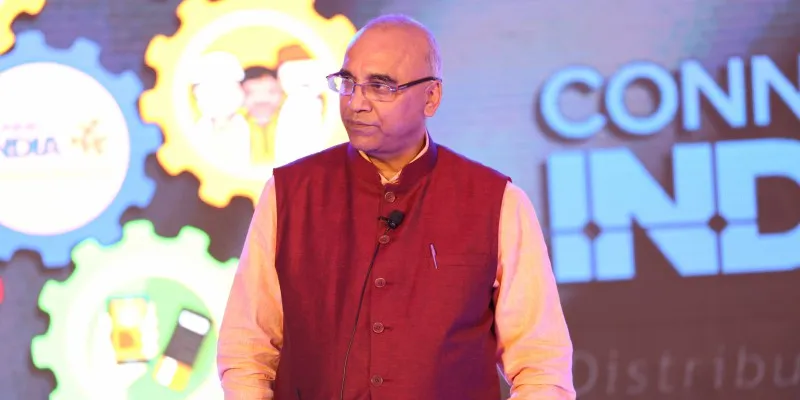Connecting every nook and cranny of India, Connect India is making last mile delivery efficient
Logistics startup Connect India partners with local retail entrepreneurs who, in turn, help in hyperlocal delivery for small-and-medium enterprises and commerce players.
At a glance:
Startup: Connect India
Year it was founded: 2015
Based out of: Bengaluru
Founders: LR Sridhar and Vijay Mahajan
Problem it solves: Last mile logistics connectivity in rural India
Sector: Logistics
Funding: Undisclosed
Ecommerce companies are now commonplace; not only is it easier to order online, but the processes have also become simpler, from checking order numbers and stock, processing the orders, managing logistics, and finally the delivery. In fact, ecommerce has enabled the growth of several companies in the payments and logistics space.
Even as ecommerce as a sector was picking up in 2014-15, there came a few glitches - last mile delivery was a challenge, especially in rural markets. To address this very gap, L.R. Sridhar, who had spent close to four decades in the logistics industry, decided to set up Connect India and connect every single village in the country by 2020.
He partnered with local retail entrepreneurs in different parts of the country to work as common service centres or last mile delivery partners. Sridhar understood logistics was a key component for any business, and yet had remained the lowest priority.

The model
“The connectivity beyond the top 100 locations in the country was always a problem. This resulted in the creation of many middlemen and the cost of the commodities and products became expensive as the middlemen have margins added to the cost of the products,” says Sridhar.
Connect India’s model, Sridhar believes, will help local entrepreneurs create an alternative revenue stream as the retail business was shrinking due to e-tailing growth.
“The idea is to create one lakh partners by 2020. These, in turn, provide local jobs for at least five people, and that will ensure half a million jobs in local areas. This model also provides an opportunity for rural commerce and multiple services under a single terminal,” says Sridhar.
What Connect India essentially does is help create nearness to the urban market, and the much-needed connect to the same. Once Sridhar had the idea, he roped Vijay Mahajan as his Co-founder. Vijay, who worked with rural markets and livelihoods.
The workings
Connect India’s focus is on last mile delivery and demand generation, or assisted commerce. For ecommerce companies like Amazon and Flipkart, Connect India picks shipments from the various company hubs and drops them off at local partners, who in turn, deliver to the end customer. The app gets updated with delivery details.
For customers who want to order online, partner store owners assist in booking orders online through the portal installed in their store. The partners, thus, also act as direct sales agents for different companies and book orders whose fulfilment is ensured through the Connect India distribution system.
“For small and medium ecommerce companies, we do end-to-end service including linehaul management and last mile delivery,” says Sridhar.
The challenges
The major challenge for Connect India was to motivate the retailers to go out of their shops to deliver shipments. The team was able to overcome this challenge with continuous training and by demonstrating it to be a viable model to augment income.
The next challenge was to drive volumes to these stores. This, however, saw a change with increasing ecommerce customers, and even the banking and courier industry pushed volumes to both urban and rural markets. This, Sridhar adds, eliminates the middlemen and makes logistics costs cheaper due to higher volumes.
Connect India has a team of over 200 people and has over 5,000 last mile delivery partners in markets across 13 states. Started in 2015, Connect India claims to have an average monthly run rate of Rs 3 crore and claims to be moving towards a breakeven. The team claims to be doing over 30,000 shipments a day.
Connect India charges ecommerce companies and other customers for the service on a per delivery basis and there are different rates for rural and urban customers. Part of the revenue is shared with the company’ last mile delivery partners.
The market
Since 2015, the number of logistics marketplaces and startups has been growing. Most have started finding ground since the boom and growth of ecommerce. Players like Blackbuck, Lobb and Trukky have focused on the B2B space, while those like Shadowfax have trained their sight on last mile delivery. Ecom Express and Delivery have a combination of line haul, last mile delivery and warehousing. There are also other logistics companies like Rivigo.
In the World Bank’s measure of international supply chain efficiency, an index that comes out every two years, India’s ranking rose from 54 in 2014 to 35 in 2016. With the rollout of the Goods and Service Tax last year, the introduction of the e-way bill and the scaling up of the tech-enabled logistics segment, this ranking is expected to improve this year.
Connect India is a local partner-driven asset light variable model, and also has multiple services to create additional revenue streams. Sridhar adds that it is more reliable as entrepreneurs are locals, and understand the geographies well. “Also, sustainability is never an issue since they already have other streams of revenues and hence no fixed costs,” says Sridhar.
Funding and future
Connect India has raised funding from Aavishkar Capital and a clutch of investors. Sridhar adds that the company is in the process of raising further funds to create a network that covers all pincodes in the country through 50,000 entrepreneurs over the next three years. This will create a capacity of 1 million to 1.5 million deliveries a day, and create over a million orders a month on the aided commerce activity, thus enhancing demand in rural markets.
“The vision is to create a billion-dollar enterprise in the technology last mile distribution eco-system and create substantial local jobs in doing so,” says Sridhar.







